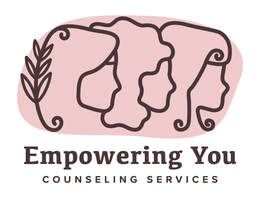 "We all have it. We are all afraid to talk about it. The less we talk about shame, the more control it has over our lives." - Brene Brown Shame is an emotion that relates to our sense of self. It's a painfully strong emotion that leaves us in fear of being unlovable and unworthy. It makes feel flawed and never good enough. Signs you may be struggling with shame:
How Therapy Treats Shame Therapy gives you the tools to work through and fight shame. Therapy will help you with the following :
0 Comments
 “Every woman that finally figured out her worth, has picked up her suitcases of pride and boarded a flight to freedom, which landed in the valley of change.” ― Shannon L. Alder What Is Self-Esteem? Self- Esteem is often described as a fair-weathered friend here one minute and gone the next. Self-Esteem is how we view our selves in comparison to others. Individuals well-being can easily be influenced by their self-esteem. Low self-esteem is one of the most common underpinnings of individuals seeking therapy. Signs of low self-esteem/confidence:
Some people develop low self-esteem in childhood. When adults harshly criticize children for mistakes, it's easy to internalize those messages. Negative childhood experiences, such as trauma, child abuse or bullying, can also contribute to low self-esteem. As an adult experiences such as break ups, loss of employment, and other life changes can impact your self esteem. Therapy For Low Self-Esteem . Therapy teaches you self-compassion. Self-Compassion is loving and treating yourself the way you would a friend in need. Self-compassion is made up of three parts:
 All of us are familiar with the heart-quickening nervous feeling of anxiety. We feel afraid, we may find it harder to breathe, and are worried something bad is about to happen. Anxiety is meant to warn of us potential dangers both physically and emotionally. Its sole purpose is to keep us alive and out of danger. Sometimes our anxiety can become hijacked. Think of anxiety as a light switch on and off. When working correctly it turns itself on to warn of possible danger such as walking down a dark alley at night and then returns to the off position when the danger has passed. When your anxiety has been hijacked it's stuck in the on position. Which in turn keeps you feeling on edge and unable to relax. You are constantly ruminating about the past and worrying about the future and never really living in the present. This hijacking keeps you from living in the present, feeling at ease, trying new experiences, going out in public and maybe even talking in front of others. Often, an individual with anxiety will have experienced unstable or frightening environments as a child. They are exposed to abuse and emotional neglect and feel it as a threat to their survival. This leads to their anxiety switching to the constant on mode. Also, some of us experience anxiety as result of experiencing certain emotions that we never learned how to accept or process. If we are experiencing anger or sadness but have always been taught that they are unacceptable emotions to have then when we experience them, we begin to feel anxious because we don’t know how to handle them. How Therapy Helps With Anxiety Therapy helps anxiety in many ways. First, therapy provides you with a safe space to share your thoughts, feelings and experiences. Unlike your friends and family, your therapist understands how debilitating and overwhelming anxiety can be. Clients often experience a decrease in anxiety as they begin to feel more comfortable sharing parts of themselves. Second, in therapy, you will start to explore what triggers your anxiety and how to cope with it. Third, anxiety has a physical response in our bodies. Therapy helps you learn more about it, tolerate it and accept it. Working on the parts listed above decreases your anxiety and allows you to stop living in the past and future and start living in the present. SYMPTOMS OF ADULT ANXIETY:
 “Depression is the most unpleasant thing I have ever experienced. . . . It is that absence of being able to envisage that you will ever be cheerful again. The absence of hope. That very deadened feeling, which is so very different from feeling sad. Sad hurts but it's a healthy feeling. It is a necessary thing to feel. Depression is very different.” J.K. Rowling I describe depression as a dark cloud that hangs over you. At times this cloud becomes so dark and large it is difficult to see anything other than darkness. You feel alone and unsupported. That cynical, overly critical voice in your head becomes louder and more persistent. Low moods and energy lead to lack of motivation, isolation and little interest or pleasure in things. Thoughts of hopelessness/worthlessness creep in a and become painfully overwhelming. Sometimes people experience thoughts of hurting themselves or even of death. There are several factors that can lead to depression, such as family history, relationship problems, life problems, unresolved grief, trauma or shame. How Therapy Helps With Depression Therapy helps with depression by putting you in contact with a caring and supportive therapist. Your therapist understands that depression isn't something you can "just get over". They understand depression runs deeper. You don’t have to feel alone with these overwhelming thoughts and feelings. As clients open up in therapy and receive empathy and validation, they begin to experience relief and connection. As we explore your depressive symptoms, we work to identify the root of your depression. Discussing your depression is often the first step to examining your Backstory in a safe and caring environment that allows you to heal the parts that need healing. This process helps to reduce your current symptoms and create long lasting and meaningful change. SYMPTOMS OF ADULT DEPRESSION:
|
Author'sApril Schoonover, Archives
May 2024
Categories |
|
2008 NW Military Suite 3, San Antonio, TX 78213
|
(210) 942-8911
|
Hours:
Monday-Friday 10 am to 6 pm
Monday-Friday 10 am to 6 pm
Website by TherapyPrime

 RSS Feed
RSS Feed